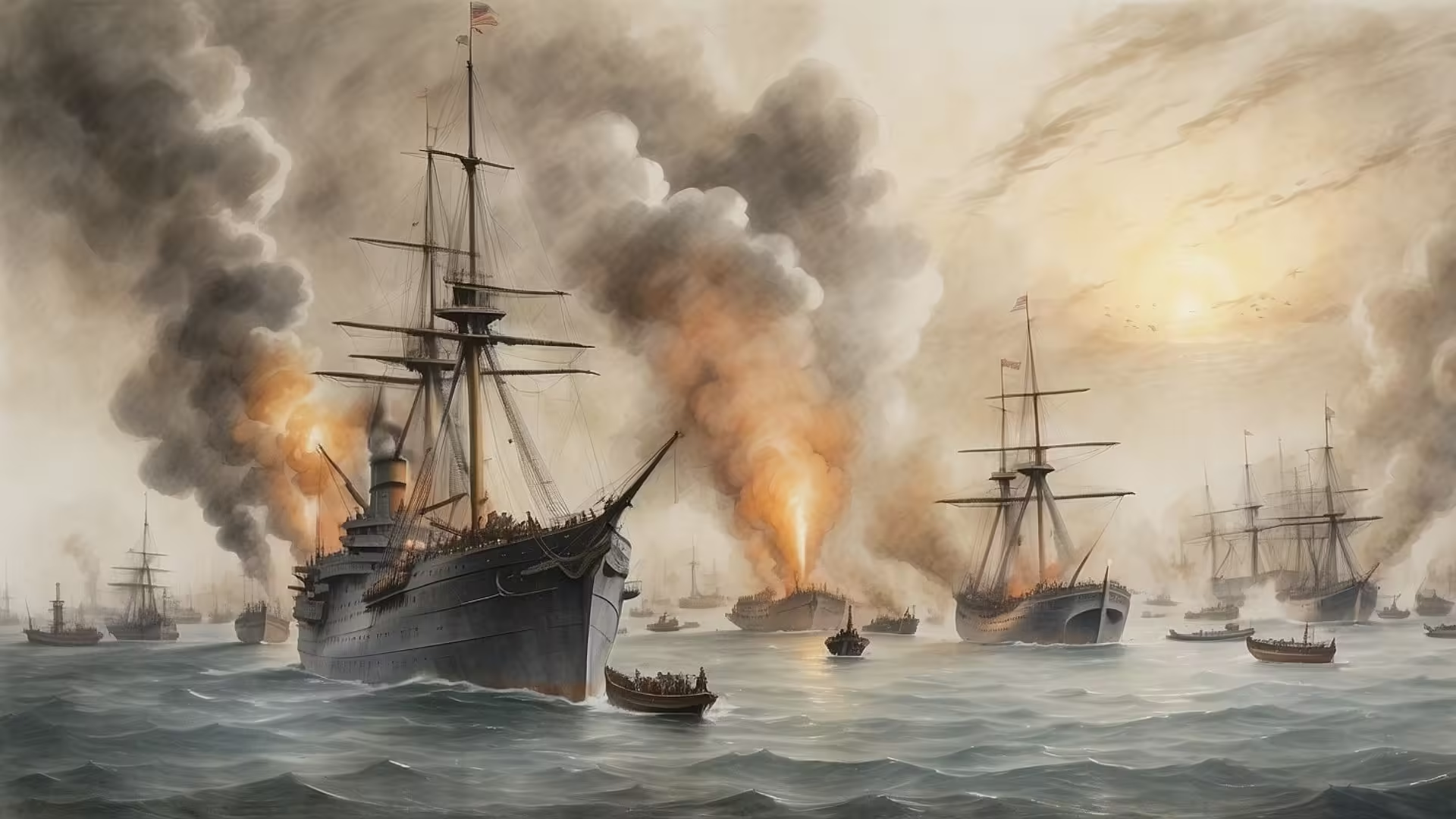The Gist
How Did the War Begin?
The Anglo-Zanzibar War on August 27, 1896, was a direct result of political tensions in the East African island of Zanzibar. Zanzibar had been a British protectorate, meaning the British had significant influence over the local government. When the pro-British Sultan Hamad bin Thuwaini passed away unexpectedly, his cousin Khalid bin Barghash seized the throne without British approval. This act of defiance put him on a collision course with the British, who wanted a more compliant ruler in power.
The British authorities immediately issued an ultimatum: Khalid had to step down and leave the palace. He refused. In response, the British fleet, anchored off the coast of Zanzibar, prepared for action. And just like that, the stage was set for one of the most unusual wars in history.
What Happened During the War?
The British ultimatum expired at 9:00 AM on August 27, and the war began. British naval ships opened fire on the Sultan’s palace, launching a barrage of shells that caused significant damage. Khalid’s forces, although numbering around 2,800 men, were no match for the British. Most of them were quickly overwhelmed, and within 38 minutes, the Sultan’s resistance crumbled. Khalid fled to the German consulate, and the war was effectively over.
The British sustained minimal losses, with one sailor injured, while the Zanzibari side suffered around 500 casualties. The palace was in ruins, and the British reinstalled a ruler more aligned with their interests. The conflict was over so quickly that it feels almost surreal—more like an intense diplomatic disagreement than an actual war.
Why Did It End So Quickly?
The reasons for the war’s brevity boil down to military imbalance and political strategy. The British fleet was vastly superior, and Khalid’s forces were poorly equipped to defend against modern warships. Additionally, the British were determined to send a clear message: their authority would not be challenged, and any attempt to defy them would be swiftly dealt with. With their military dominance, it took mere minutes for the British to neutralize the opposition.
The Aftermath of the War
In the aftermath, the British installed a new sultan, Hamoud bin Mohammed, who was more cooperative with British policies. Khalid bin Barghash, meanwhile, remained in asylum at the German consulate before eventually escaping to East Africa. The incident solidified British control over Zanzibar and demonstrated their power in the region. Though brief, the war was a striking reminder of the colonial dynamics that shaped Africa during that era.
What Makes This War So Fascinating?
The Anglo-Zanzibar War is a perfect example of how not all wars are drawn-out battles. It also highlights the complexities of colonialism and the power struggles that came with it. The fact that such a short conflict had long-lasting political implications makes it a fascinating piece of history. It’s not every day you hear about a war that starts and ends within the time it takes to watch a TV episode.
A War for the History Books
The Anglo-Zanzibar War might have lasted only 38 minutes, but it left an imprint on history. It serves as a reminder that even brief moments of conflict can have significant consequences. Whether you view it as a bizarre episode or a calculated political maneuver, this shortest war in history is a testament to the unpredictability of global power struggles.
Let’s Talk
The Anglo-Zanzibar War—38 minutes! Can you believe that? It’s almost comical, especially considering how we usually think of wars dragging on for years. It’s like if you started watching an episode of your favorite show, and by the first commercial break, the whole story had wrapped up. But the more you think about it, the more you realize there’s a lot to unpack here beyond just the absurdly short timeframe.
What fascinates me most is how this “war” wasn’t just a spontaneous fight—it was a perfect example of power dynamics at play. Zanzibar was basically caught between its own political ambitions and British colonial interests. It makes you wonder how many other conflicts throughout history weren’t about fighting battles but about sending messages. The British didn’t just want to win; they wanted to make sure everyone knew that crossing them wasn’t an option. It’s kind of like when someone challenges you to a game of chess, and you beat them in four moves—there’s a certain message there, right?
And let’s talk about Khalid bin Barghash for a second. Imagine being so sure of your power that you defy the British Empire… only to run to the German consulate before the dust settles. Can you picture how awkward that must have been? “Uh, so… about that rebellion… Mind if I crash here for a bit?” It’s funny, but it also says a lot about how quickly things can change. One minute you’re on top of the world, the next you’re knocking on a neighbor’s door hoping they’ll hide you.
What’s also interesting is how the war highlights the colonial mindset of the time. The British weren’t just interested in winning—they were interested in control. They didn’t just install a new sultan; they made sure he was someone who would play by their rules. It’s like replacing a stubborn manager at work with someone who’s much easier to deal with—except on a much bigger, more historical scale.
I think there’s a real-life takeaway here too. Ever been in a situation where things escalated way too quickly, and before you knew it, everything was over? Maybe it was a heated argument that ended abruptly, or a decision you made in the heat of the moment that left you wondering, “Wait, did that just happen?” Sometimes, conflicts—whether personal or global—end faster than we expect, but they leave behind consequences that linger far longer than the fight itself.
This war also makes me think about how we use power and influence today. How often do we see people—or even governments—act not because they need to, but because they want to make a statement? And let’s be honest, haven’t we all had those moments where we “burn a bridge” (as we talked about earlier) just to prove a point? The Anglo-Zanzibar War might’ve only lasted 38 minutes, but the dynamics behind it feel strangely familiar. It’s the same kind of posturing we see in politics, business, and even personal relationships.
So, what do you think? Have you ever found yourself in a situation where things escalated way too quickly, and you were left wondering how it all ended so fast? Or maybe you’ve experienced the fallout of a conflict that seemed small in the moment but had bigger consequences down the road. It’s worth thinking about, because whether the battle lasts 38 minutes or 38 years, the impact often lingers much longer than we expect.
Let’s Learn Vocabulary in Context
Let’s break down some of the key vocabulary from the shortest war in history and see how these words fit into everyday situations. First, there’s protectorate. In the case of Zanzibar, being a British protectorate meant that while Zanzibar still had some local control, Britain essentially called the shots, especially when it came to political matters. You can think of a protectorate like a kind of “supervisory” relationship. It’s a bit like when a parent gives their teenager some freedom but still steps in when major decisions need to be made. You might use it metaphorically: “My old boss treated my role like a protectorate—letting me make small decisions but swooping in whenever things got serious.”
Now let’s talk about ultimatum—a word that makes any situation feel intense. An ultimatum is a final demand or statement of terms, where refusal leads to a serious consequence. In the Anglo-Zanzibar War, the British gave Khalid bin Barghash an ultimatum: step down, or face the consequences. In real life, ultimatums happen more often than you’d think. You might have heard something like, “If you don’t clean your room, no video games for a week!” That’s an ultimatum right there. They tend to escalate situations, though, so they should be used carefully—like seasoning in cooking.
Posturing is another interesting word we touched on. Posturing means behaving in a way that’s intended to impress others or make a point, even if it’s not entirely genuine. Britain’s rapid response to Zanzibar wasn’t just about taking control—it was about showing everyone else in the region that defying the empire was a bad idea. You’ve probably seen posturing happen in everyday life too. Ever notice how people act a little more confident when they’re trying to impress a new group of friends? That’s posturing. It’s not always a bad thing, but it’s something to be aware of.
Then we have asylum. This is what Khalid bin Barghash sought when he fled to the German consulate after realizing he was out of options. Asylum means protection granted by a country or organization to someone who’s in danger, usually from political persecution. In modern contexts, asylum is a serious matter, especially for people fleeing conflict or oppression. But you might use the term playfully: “After that chaotic family gathering, I sought asylum at my best friend’s place for some peace and quiet.”
And how about barrage? The British navy’s attack on the palace was described as a barrage of shells—meaning a continuous, overwhelming attack. In a more casual setting, barrage can describe anything that comes at you all at once. Ever had a day where you received a barrage of emails before you even finished your morning coffee? It’s the same idea—being hit with a relentless stream of something.
So, here are some questions to think about: Have you ever been given an ultimatum, or maybe you’ve issued one yourself? How did it play out? And can you think of a time when you or someone else was posturing—acting bigger or bolder to make an impression? These words aren’t just part of history—they show up in our lives more often than we might realize.










0 Comments